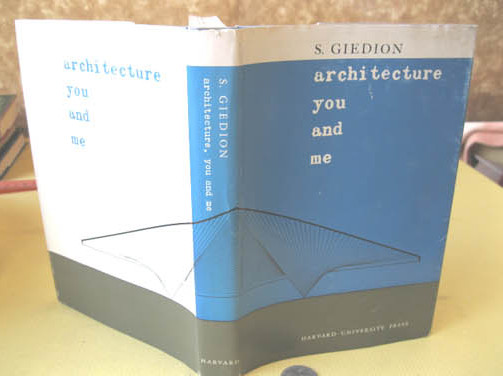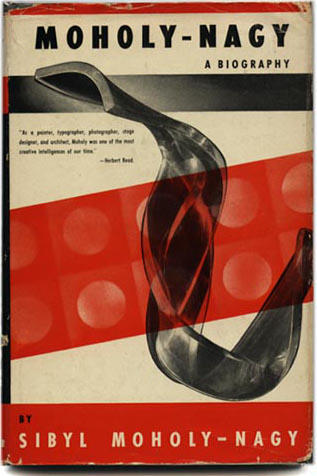Siegfried Giedion: Architecture, You and Me: The Diary of a Development (1956/1958)
Filed under book | Tags: · architecture, art, city, history of architecture, painting, sculpture, urbanism

Collection of essays from 1937-1956 by an influential Prague-born and Switzerland-based historian and critic of architecture.
First published in German as vol. 18 of the Deutsche Enzyklopaedie under the title Architektur und Gemeinschaft by Rowohlt, Hamburg, 1956
Translated by Jaqueline Tyrwhitt
Publisher Harvard University Press, Cambridge, MA, 1958
221 pages
Review: Harold Ehrensperger (The Saturday Review).
Comment (0)Sibyl Moholy-Nagy: Moholy-Nagy – Experiment in Totality (1950–)
Filed under book | Tags: · architecture, art, art history, bauhaus, biography, constructivism, graphic design, history of architecture, painting, typography

“This biography of the Constructivist leader László Moholy-Nagy illustrates his struggle for a total approach to seeing-teaching-creating. Written by Sibyl Moholy-Nagy, László’s second wife and lifetime collaborator, she witnessed many of the defining moments of the Bauhaus movement and its migration to the United States and its continuation as the Chicago New Bauhaus and Institute of Design. An excellent first-person account.”
With an Introduction by Walter Gropius
Publisher Harper & Brothers, New York, 1950
262 pages
Second edition
Publisher MIT Press, 1969
xviii+259 pages
PDF (1950)
Internet Archive (1950, multiple formats)
PDF (2nd ed., 1969, added on 2020-1-3)
Gary Indiana: Utopia’s Debris: Selected Essays (2008)
Filed under book | Tags: · architecture, art, cinema, film, literature, popular culture

Gary Indiana is one of America’s leading cultural critics—a public intellectual who has written key essays on every aspect of American culture. Utopia’s Debris comprises selections of his very best work, revealing him to be an enormously acute, frequently scabrous, and always brilliant observer of the best and worst America has to offer. His writings range from popular culture—trash novels, architectural wonders and horrors—to appreciations of the best of modern literature, art, and cinema. They include his convincing (and highly entertaining) debunking of fashionable conspiracy theories, a spirited and contrarian defense of Bill Clinton’s autobiography, a Mencken-like examination of the rise of Arnold Schwarzenegger and the politics of celebrity in what Indiana calls the Age of Contempt. A postmodern Emerson, Indiana wields scalpel-sharp wit and a fealty to logic on issues in which, all too often, irrationalism and emotionalism hold sway. At times rigorously serious, at other times whimsical, Indiana’s most conspicuous feature is skepticism—his wildly satirical contempt for conventional wisdom.
Publisher Basic Books, 2008
ISBN 046500248X, 9780465002481
315 pages

